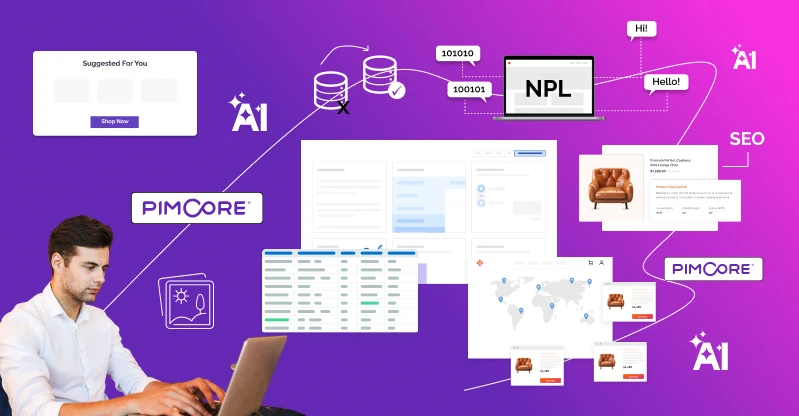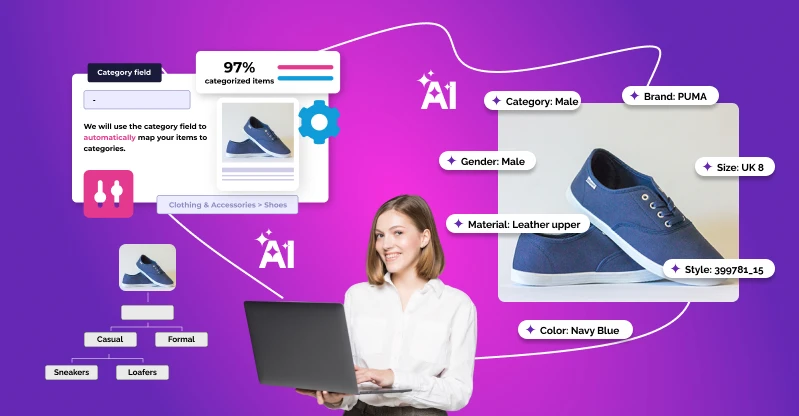How PIM Powered by AI Is Transforming eCommerce Data Management Globally

Table of Contents
As with the data-driven economy that’s popular today, eCommerce companies are faced with the challenge of coping with the increasing need to manage and deliver high amounts of product data across multiple channels.
Consumers anticipate seamless, coherent, and tailored experiences as they shop online on websites, mobile apps, or marketplaces.
With more business and information complexity, this information cannot be managed manually or traditionally. AI-powered Product Information Management (PIM) is a revolution using automation, intelligence, and scale to redefine product data management for businesses.
With the adoption of artificial intelligence into product information management software, business firms can gain efficiency, precision, and effective product experiences that appeal to customers worldwide.
In this blog, we will explore how PIM will transform eCommerce data management with an AI-powered tool.
The New eCommerce Data Management Role for AI
Classic PIM systems were created to merge and make product data available at affordable prices. But with rising SKUs, constant revisions, and multi-channel requirements, consistency of the data across channels became tougher.
Artificial Intelligence reverses these limitations by presenting PIM systems with smart data identification, automation, and predicted data. Such compatibility renders companies smarter, faster, and more efficient in their decision-making.
Smart Data Cleansing and Validity
Machine learning models detect and correct errors, duplicates, or blank product data. AI fills missing dimensions or material characteristics using context data or trend history.
AI cleansing makes product data accurate and marketplace and brand compliant — with minimal human interference but maximum precision in data.
Auto Product Categorization and Tagging
AI in PIM technology employs NLP and machine learning to categorize products automatically. This eliminates man-hours of labor in favor of teams and tags each product up correctly with the correct attributes, ensuring they’re discoverable and enhancing SEO performance.
The outcome is accelerated onboarding and enhanced discoverability through digital channels.

Dynamic Content Enrichment
Artificial intelligence improves product data quality with highly customizable, SEO-enriched product descriptions optimized to the interests of the audience.
Content and tone may be readily translated to several markets or consumer groups, technical for B2B, lifestyle-oriented for B2C, or geo for in-market buyers.
These types of automated enrichment drive higher interest and conversion by optimizing product content for future relevance and engagement.
Predictive Analytics for Product Insights
Artificial intelligence product information management solution provides actionable insights on product performance. Predictive analysis determines best sellers, predicts customer demand, and maximizes marketing.
Sales and customer satisfaction extension occur due to data-driven strategic decision-making.
AI-Driven PIM Facilitating Time-to-Market Acceleration
Quicker is better in eCommerce. Companies that are able to bring new products to the market quicker and update data in real-time have a massive competitive edge. AI in PIM solutions automate and expedite product launch cycles with end-to-end workflows without disruption.
Streamlined Onboarding Workflows
AI supports import, mapping, and real-time validation from other sources like suppliers, ERP, or spreadsheets. AI automatically infers attribute relationships, freeing configuration time and getting new products to digital shelves more quickly.
Real-Time Channel Syndication
By consolidated AI with PIM, brands can easily manage their product data from web stores, marketplaces, and CMS into a harmonized, unified structure. Ensure better product information updates to be replicated on all channels at once, guaranteeing consistency and preventing delays caused by manual publishing.
Improved Cross-Team Collaboration
AI in PIM is that one, unified source of truth that everyone has access to across teams — marketing, ops, sales, and IT. Automated role-based workflows and notifications minimize duplicate effort, approval cycles, and collaborate much better.
This unified, single framework not just simplifies but also drives data consistency across teams.
Building a Better Customer Experience with AI-driven PIM
Consumers these days do not demand plain accurate information, they demand interactive, informative, and personalized experience. AI in PIM alone can provide them such advanced digital experience.
Hyper-Personalized Product Experience
With purchase history, location, and behavior, AI dynamically personalizes content as per user intent. For example, it can change tone, accentuate unique benefits, or show local images, with experiences that customers feel are personalized and context-sensitive.
Intelligent Search and Discovery
Semantic search with AI-powered search keeps context, intent, and proximal words to allow customers to locate what they seek, even attempting with incorrect or misspelled words. It helps to deliver better search results, boost customer satisfaction, and cut down cart abandonment.
Single Brand Experience Across Channels
AI delivers product information to all touch points, from advertisements and web listings to catalogs offline. Consistency protects the brand, and AI-based localization pulls out fine differences in terms of cultural and language nuances.
Data Governance and Compliance Redefined
With eCommerce going global, compliance and data governance will become more challenging. AI in PIM makes automatic checks for compliance with regulations and for global standards as easy as pie.
AI helps annotate such compliance fields omitted like safety warnings or certification or determine region-based labeling requirements. It keeps the product information up to date to avoid legal trouble for brands and allows consumers’ trust to be maintained.
The AI-Driven Competitive Advantage of Product Information Management
In the age of aggressive digital competition today, excellent product data management is the difference between making and breaking a company. AI product information management solutions transform product data into a business growth driver, an innovation catalyst, and a business excellence driver.
Automation That Grows with Your Business
AI performs the usual tasks such as categorization, tagging, and verification of data with ease as businesses grow. With a few hundred, thousands, or millions of SKUs, AI provides speed with precision without added human capital.
Unrivaled Data Precision and Consistency
AI automatically verifies and corrects data errors, producing accurate and consistent product data at all channels. That is what gives consumer confidence, minimizes returns, and maximizes marketplace positions.
More Compelling Customer Experience with Insights
By analyzing customer interaction and taste, AI is tailoring product content by segment, for more engagement, higher conversion rates, and making every touch count.
Smaller Time-to-Market and More Agility
Product lifecycles are shortened by AI-powered autonomous onboarding and update cycles, which also drastically shorten launch horizons. These days, businesses are setting the pace instead of racing to stay ahead of emerging trends.
Intelligent Decision Making through Predictive Analytics
AI in PIM provides prescriptive recommendations for selling activity so businesses can optimize the return on price, stock, and advertising spend. Smart prescriptive predictiveness ensures informed decisions are evidence-driven.
Frictionless Multichannel and Cross-Border Business
AI wipes out localization, translation, and compliance verification, enabling brands to expand globally without interruption. It provides each territory and channel with precisely individualized, compliant information.

Enhanced Brand Identity and Trust
AI delivers the same voice, tone, and level of content at every customer touch point, for building trust and long-term dependence on integrity.
Reduced Operating Cost and Improved ROI
Manual processing is minimized with automation, hence conserving time and cost. With lower time to market as well as improved conversion rates, the ROI of AI in PIM excels.
Future-Proof Flexibility and Scalability
AI in PIM software is adaptive. With the emergence of new channels, technology, or formats, AI can be retrained to support new models for data to keep businesses technologically agile and ahead of the curve.
Innovation-Driven Differentiation
Firms can use AI to drive value differentiation by way of intelligent automation, content creation, and predictive personalization, in order to innovate and leapfrog competitors in saturated markets.
AI-driven product information management consulting not only organizes data, it helps firms make quicker decisions, make better strategies, and provide improved customer experiences. It closes the tech-experience gap, gets brands contemporary and forward-looking.
Emerging Trends: The Future of AI- Driven PIM Systems
The convergence of PIM and AI continues to advance, with a still brighter future on the horizon.
A few of the future trends include:
AI Generative generating product content, images, and even videos in an optimized state.
Voice and Image Recognition, where AI visually recognizes products and auto-populates data fields.
Augmented Reality (AR) Data Mapping to display products as 3D models in locations.
IoT Integration, where products supply updates of PIM information based on usage or performance.
Such integrations will keep improving the accuracy, customization, and scalability of the data for making AI-driven PIM the backbone of digital commerce ecosystems.
Conclusion
AI-driven Product Information Management is now reality and not science fiction anymore but the new normal for digital commerce.
It makes it possible for organizations to shift from human effort-based processing of data to intelligent, automatic, and customer-centric processes.
By adopting AI in PIM, businesses can seek to be more accurate, quicker to market, and more engaging and coherent product experiences.
In an expanding eCommerce economy, an investment in professional product information management services is a step towards digital excellence, business efficiency, and future competitiveness.
The future belongs to those businesses that can turn their product data into smart data, and AI-driven PIM is the solution to achieve this. Consult with our PIM experts to know more about the implementation.
FAQs
 Which AI capability do we deploy in PIM solutions?
Which AI capability do we deploy in PIM solutions?
Machine learning, NLP, and predictive analytics capabilities are deployed to support automated enrichment, classification, and validation of data.
 In what way do AI in PIM solutions shorten time-to-market?
In what way do AI in PIM solutions shorten time-to-market?
Product onboarding, enrichment, and data distribution are processed automatically by AI in PIM, supporting quicker and flawless product launches.
 Can ERP, marketplaces, and CMS be integrated with PIM?
Can ERP, marketplaces, and CMS be integrated with PIM?
ERP, marketplaces, and CMS systems can be integrated with PIM in a way to support real-time synchronizations in channels.
 What kind of organizations will derive maximum value from AI in PIM?
What kind of organizations will derive maximum value from AI in PIM?
Retailers, manufacturers, distributors, and large eCommerce players with multiple, complex product catalogs will derive maximum value.
 What is the return on investment that the deployment of AI-based PIM can yield?
What is the return on investment that the deployment of AI-based PIM can yield?
Greater efficiency, less manpower cost, quick implementations, and better conversions.



